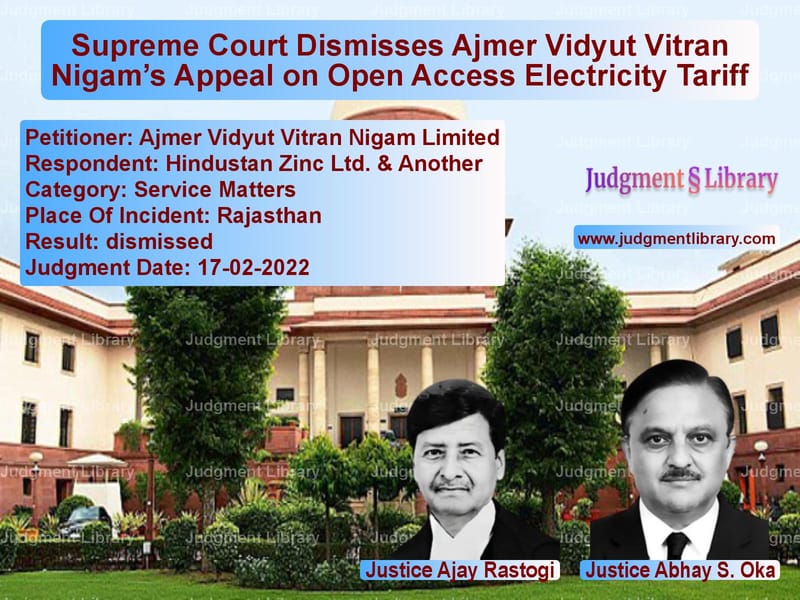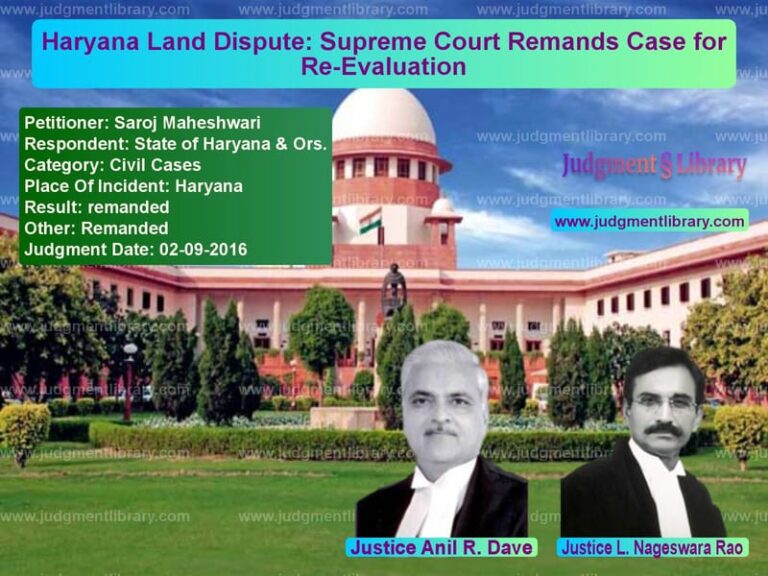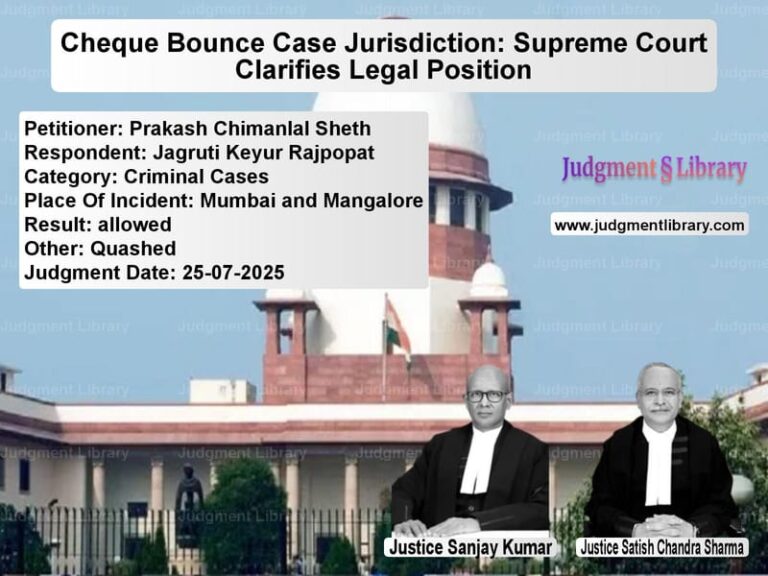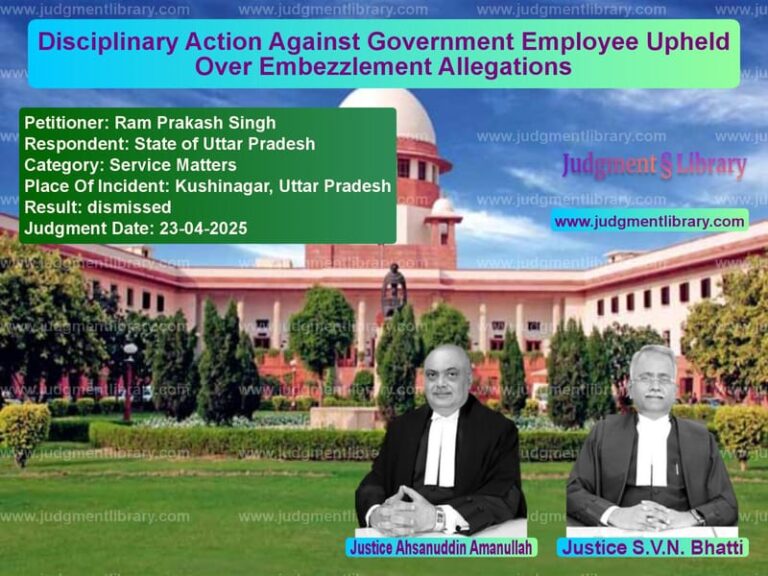Supreme Court Dismisses Ajmer Vidyut Vitran Nigam’s Appeal on Open Access Electricity Tariff
The Supreme Court, in Ajmer Vidyut Vitran Nigam Limited vs. Hindustan Zinc Ltd. & Another, delivered a crucial judgment concerning the interpretation of open access electricity tariffs. The case revolved around the dispute over the tariff applicable for inadvertent drawal of electricity by an open access consumer.
Background of the Case
Ajmer Vidyut Vitran Nigam Limited (AVVNL), a government-owned electricity distribution company, challenged a decision of the Appellate Tribunal for Electricity (APTEL), which ruled in favor of Hindustan Zinc Ltd. (HZL). The dispute arose over the interpretation of the Rajasthan Electricity Regulatory Commission (RERC) regulations regarding the tariff applicable when an open access consumer draws excess electricity beyond the agreed limits.
HZL, a large industrial consumer, operates a captive power plant and uses AVVNL’s distribution system for wheeling electricity to its other units. However, in cases where its captive power supply was insufficient, HZL relied on the grid, leading to inadvertent drawal of electricity.
Arguments by the Parties
Petitioner’s Arguments (Ajmer Vidyut Vitran Nigam Limited)
- The agreement executed in 2006 clearly stated that inadvertent drawal of electricity would be charged at the temporary supply tariff.
- The Rajasthan Electricity Regulatory Commission (RERC) issued an amendment in 2007, changing the tariff structure for inadvertent drawal, making it subject to regular supply rates.
- The amendment should apply retrospectively to all agreements signed before its implementation.
- The Tribunal’s decision to apply the amended provision prospectively was erroneous and financially burdensome for the distribution company.
Respondent’s Arguments (Hindustan Zinc Ltd.)
- The 2007 amendment substantially altered the tariff conditions for inadvertent drawal, shifting from temporary supply tariff to regular supply rates.
- Such a fundamental change should not apply retrospectively, as it would impose unfair financial liabilities on open access consumers.
- The Tribunal correctly ruled that the modification must be applied prospectively from the date of the amendment (September 15, 2007).
- The agreement’s terms were clear at the time of execution, and retrospective changes should not be imposed unilaterally.
Supreme Court’s Key Observations
1. The Amendment Was a Substantial Change
The Court analyzed whether the 2007 amendment merely clarified the existing tariff structure or introduced a fundamental change:
“The shift from a temporary supply tariff to a regular supply tariff is a significant alteration in financial liability and cannot be considered a mere clarification.”
2. Prospective vs. Retrospective Application
The Court held that amendments introducing substantial financial implications should generally be applied prospectively:
“The amended tariff structure, being a major financial burden on consumers, must be given prospective effect to ensure fairness and predictability in contractual agreements.”
3. Parties’ Expectations Under the 2006 Agreement
The Court ruled that both AVVNL and HZL had agreed to the existing tariff conditions at the time of signing the agreement:
“The agreement in force at the time must govern contractual obligations unless explicitly stated otherwise in subsequent amendments.”
4. Upholding the Tribunal’s Decision
The Supreme Court affirmed APTEL’s ruling that the amendment should not apply retrospectively:
“The Tribunal correctly ruled that any fundamental changes to contractual terms must be applied from the date of their enactment, ensuring fairness to all stakeholders.”
Final Judgment
The Supreme Court ruled as follows:
- The appeal by Ajmer Vidyut Vitran Nigam Limited was dismissed.
- The Appellate Tribunal’s decision to apply the amended tariff rates prospectively was upheld.
- AVVNL was directed to adjust any excess charges collected from HZL due to retrospective application of the 2007 amendment.
Impact of the Judgment
This ruling has significant implications for open access consumers and electricity regulatory authorities:
- Protects consumers from retrospective charges: Ensures that open access consumers are not burdened with unexpected financial liabilities.
- Sets a precedent for prospective amendments: Reinforces that regulatory changes with financial implications should not be applied retrospectively.
- Strengthens contract enforcement: Upholds the principle that contracts must be honored as per their original terms unless mutually renegotiated.
- Clarifies regulatory authority limitations: Reinforces that regulatory commissions cannot impose retrospective liabilities without explicit statutory authority.
The Supreme Court’s ruling reinforces fairness in contractual agreements and ensures that open access electricity consumers are not subjected to unforeseen financial burdens due to retrospective regulatory amendments.
Petitioner Name: Ajmer Vidyut Vitran Nigam Limited.Respondent Name: Hindustan Zinc Ltd. & Another.Judgment By: Justice Ajay Rastogi, Justice Abhay S. Oka.Place Of Incident: Rajasthan.Judgment Date: 17-02-2022.
Don’t miss out on the full details! Download the complete judgment in PDF format below and gain valuable insights instantly!
Download Judgment: ajmer-vidyut-vitran-vs-hindustan-zinc-ltd.-supreme-court-of-india-judgment-dated-17-02-2022.pdf
Directly Download Judgment: Directly download this Judgment
See all petitions in Public Sector Employees
See all petitions in Disciplinary Proceedings
See all petitions in Judgment by Ajay Rastogi
See all petitions in Judgment by Abhay S. Oka
See all petitions in dismissed
See all petitions in supreme court of India judgments February 2022
See all petitions in 2022 judgments
See all posts in Service Matters Category
See all allowed petitions in Service Matters Category
See all Dismissed petitions in Service Matters Category
See all partially allowed petitions in Service Matters Category







